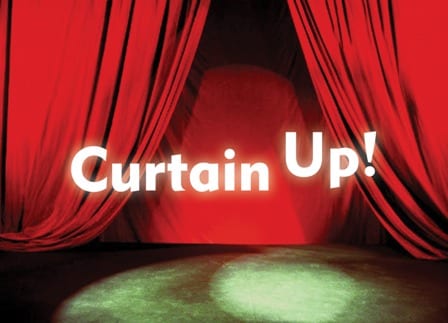Theatre Reviews

CREDIT ILLUSTRATION BY MATT PANUSKA

His Royal Hipness
“Dig Infinity!,” at the Fringe Festival, celebrates the profound comedy of Lord Buckley.
By Hilton Als · August 24, 2015
I first heard the poet and comedian Lord Buckley’s sui-generis, incredible music-as-talk during a dance performance by Karole Armitage. This was a number of years ago, but sometimes, when I close my eyes, I can still see one of Armitage’s impossibly long legs lifting and extending in front of a David Salle backdrop as Buckley’s recorded voice fills the theatre. It was the perfect soundtrack to Armitage’s electric and cool world, where movement happened very slowly, or very fast. Later, I learned that the Buckley piece was called “Subconscious Mind,” and that it was just one example of the California-born artist’s unique blend of hipster slang mixed with jazz’s erratic, smooth rhythm.
As a child, Richard Myrle Buckley (1906-1960) performed on the street with his sister. Going on to m.c. at dance marathons in Chicago and elsewhere, he developed a persona—a “Lord” who had an aristocratic bearing, sported a wax mustache, and sometimes wore a pith helmet. (Buckley’s English parents no doubt contributed to his stage character, along with jazz royalty like Duke Ellington and Lester (Prez) Young.) Sometimes backed by a small combo, Buckley emitted various sounds—he whistled or imitated a horn—that complemented his monologues. No matter what his effects, though, Buckley’s genius always felt as though it were coming from a real place, somewhere underground, where cats and chicks wore berets and argued about existentialism with musicians and painters who didn’t know there was another eleven o’clock in the day. Instead of delivering the usual Shakespeare jive—“Friends, Romans, countrymen, lend me your ears”—Buckley would say, in his gravelly voice, “Hipsters, flipsters, and finger-poppin’ daddies: knock me your lobes.” In “Subconscious Mind,” he takes us on a deep journey about being with the right lady—if she exists. How would we know? What appears to be real is in part created by our imagination.
Lord Buckley was an amazing self-creation, a white man who made a beautiful show of black jazz styles, and his life and work are being commemorated and examined in “Dig Infinity!” (at the New York International Fringe Festival, through Aug. 27). Starring the writer and performer Oliver Trager, the play is drawn in part from Trager’s 2002 book of the same title. (The book is a gasser: well researched, respectful, comprehensive.) In the nearly hour-and-a-half-long piece, Trager talks a lot of dreamy mess with Orpheus and God while doing what Buckley did best: putting the humor back into jazz without losing any of the genre’s free-fall feeling. ♦
For those familiar with the late, great comic-poet-philosopher Lord Buckley, the upcoming show at the Lilypad — “DIG INFINITY! The Return of Lord Buckley – The Hip Messiah” — will flip your wig. It’s a swirling, swinging, jazz-fueled stage production by Buckley maven Oliver Trager (author of the oral history “Dig Infinity! The Life and Art of Lord Buckley”), who takes the stage, accompanied by multi-instrumentalist Jerry Gregoire, to tell the story of Buckley’s unusual rise and terrible fall as a one-of-a-kind performer in the 1940s and ’50s, in a career that ranged from the Vaudeville circuit to Las Vegas to “The Ed Sullivan Show.”
But the “DIG INFINITY!” production is also much more. Besides being a scholar on all things Buckley, Trager — a New Yorker currently living in the Boston area — is a performer, and has put together a presentation of some of Buckley’s best-known monologues, like, for instance, a hip re-telling of “Jonah and the Whale” or a boppin’ rendition of “The Gettysburg Address” or an alternate version of Jesus’ accomplishments, titled “The Nazz.” Trager has even been known to delve deep inside Buckley’s head to bring out the trippy road piece called “Subconscious Mind.”
For those new to the unfairly overlooked brilliance of Buckley, “DIG INFINITY!” will be a real eye opener. His wild but thoughtful, jazzy but succinct, funny but barbed bits that usually manage to put a positive focus on the human condition were written decades ago, but make perfect sense in today’s often senseless world.
If that isn’t enough, plenty of people you are familiar with, among them Bob Dylan, Robin Williams, George Carlin, George Harrison, Lenny Bruce, and Tom Waits have gone on record as being influenced by Lord Buckley. It’s time to celebrate and/or discover him.
Dig Infinity!
Oliver Trager wrote, directed, and stars in Dig Infinity! He lives his Lord Buckley, whose groove goes beyond imitation. A bebop humanist who lived a crazy life, Buckley was at one time mixed up with and financed by Al Capone. He toured for the troops in WWII and appeared on Ed Sullivan, but mostly in this work we learn how he enjoyed hanging out with fellow founding hipsters and inspiring a new generation of cool cats. You can hear the flipped out angel who provided Kerouac with inspiration with his self-described “jazz semantic”: “Hipsters, flipsters and finger poppin’ daddies, knock me your lobes.” A cool drummer (Boris Kinberg) and hip, multi-instrument musician (John Kruth) provide important musical accompaniment. Lord Buckley, who recently checked out of the breathing community, awaits the adjudication of his case. He’s stoned when he meets with Orpheus, his advocate with the Big Kahuna. Orpheus (Russell Jordan), a DJ with a radio show, must meet his quota with this, his last customer before he, himself, crosses the river to the other side. (Orpheus also seems to be Charon.) Eventually “The Hip Messiah” pays the ferryman to cross the river. Having lived in his own spaced-out dimension, he has carried “The Nazz’s” message, which is to stay cool. And he has spread the news that the universe is a house of love. At Venue #11. 90 minutes. [Osenlund]

BOTTOM LINE: A mystical life-in-review of the famed hippest flipster, Lord Buckley
by Lee Kinney · September 2, 2015
Lord Buckley, the mid-century performer and poet whose cultural relevance has often been overlooked despite being variously regarded as “the hipster’s hipster” and “the hip messiah,” has been the subject of a decades-long fascination for writer Oliver Trager. Following recognition as 2014 Planet Connection Theatre Festivity’s Outstanding Adaptation, Trager’s most recent inquiry into the life of His Royal Hipness, “Dig Infinity!,” appears as part of the 2015 NY Fringe Festival and is a sampling of Buckley’s most famous monologues performed capably by Trager himself.
“Dig Infinity!” imagines a meeting between Lord Buckley and Orpheus (played mysteriously by Russell Jordan), the Greek poet and musician of myth. On the midnight following his death, Buckley appears as a guest on a strange radio program, hosted by afterlife-chaperone Orpheus. Over the course of the program, the two debate art and philosophy as Buckley steps into moments of his past life to revive his trademark performances. The life-in-review comes to be a kind of reckoning with God as it becomes clear that Buckley’s negotiation with the Almighty for an opportunity to perform on His stage carries much greater spiritual heft.
In the spirit of the radio-show conceit, Trager is backed with live musical accompaniment by John Kruth and Boris Kingberg, who provide suitably ethereal jazz undertones to support Buckley’s own percussive cadence. The music competes at times with the text, but it pleasantly places the piece in a smoother, and slicker, time.
Though the threads of the loose narrative framework are tough to tie together, Trager’s homage to Buckley is both deadly accurate and a worthy tribute to a neglected talent, and the play captures the free-spirited nature of its namesake, both in tone and content.
“Dig Infinity! Lord Buckley Gets Mythical at the Indian Cafe”
by Hannah Menzies From her blog: @hannahmenzies comics, art events, reviews & more · November 6, 2012
This “long night’s journey into day” . . . really consisted of the weighing of Buckley’s soul. Was he really full of “big high concepts” that could change the world, or just a hack “clown” singing for his supper? Author Trager himself played the role of Buckley with great virtuosity for a self- proclaimed amateur actor, delivering the non-stop linguistic somersaults necessary, as well as singing parts, with unrelenting energy and pathos. Russell Jordan, reading for the part of Orpheus threatened to steal the show with his carefully measured and subtly timed dialogue, bringing a weighty substance to the role of Orpheus that captured the feel of Hadean realms and a cosmic perspective on human frailties.
Buckley’s life, hobnobbing with many of the influential artistic and pop-culture personalities of the twentieth century, as well as stumbling in the gutters of his own highs and lows, made for excellent dramatic material. It is to Trager’s credit that he delivered the darker aspects of Buckley’s life with great honesty and sympathy rather than simply presenting the brighter side of Buckley’s naturally ebullient personality. The play’s narrative was interspersed with passages from Buckley’s own notable performance routines, such as “The Nazz,” bringing the Nazarene Jesus Christ’s miracles to life . . . the historical portions of the play were interlaced with significant themes such as the long road to racial equality.
The more literary aspects of the play also called on the high themes that Buckley discussed autobiographically, such as a love-based conception of the universe in which we ought to “worship people” as little parts of God’s nature, his questioning of religious concepts that could easily be interpreted as heretical by orthodox establishments, and overall, whether an imperfect life can nevertheless make an impact on the world.
With Orpheus as guide, Buckley witnesses both the full tragedy of violence and hatred in human history, but also the “other side” of the world with transformational storytelling, and the creation of beauty through art in a “twin bill” . . . Trager’s orphic myth presented an orphic solution of sorts: like Orpheus and Eurydice, united after a sojourn in Hades, Lord Buckley is reunited with his inspiration: Lady Buckley. Maybe, for Buckley, that would have been reward enough for his labors on behalf of culture and society.
by Richard Hinojosa · August 23, 2015
The first time I heard a Lord Buckley monologue I thought I’d stumbled on a secret code that I could use to unlock new meanings inside everyday language. His “hipsemantic” sermons have this way of breaking stories and speeches down to their base components such as his exploded drawing of the Gettysburg Address. Lord Buckley was the godfather of all hipsters and inspired countless comedians, musicians and writers but his legacy goes largely unnoticed. Thankfully, Oliver Trager and Apocalypso Theatre Collective bring his brilliance to life so we can remind ourselves of his still relevant insights into some of our most closely held passions and beliefs.
The play is set on the night of Buckley’s death. His spirit goes to a mysterious radio station where he is compelled to tell his life story to a DJ named Orpheus. Between flashbacks to points in his life, Buckley performs a “best of” sampling of his work including “The Nazz,” “Black Cross,” “Subconscious Mind,” and “Jonah and the Whale,” to the amazement of his interviewer. Halfway through the radio interview ends and Orpheus and Buckley begin to talk more and more candidly about the nature of the truth. Buckley’s view of the transitory nature of the truth gets him into some hot water with god and he finds himself on trial for his soul. He redeems himself with the climactic ending of “The Nazz” and, I assume, goes peacefully into the light.
Playwright and Lord Buckley impersonator extraordinaire, Oliver Trager has penned (and performed) a fantastic journey through the life of one of the most outrageous characters in the history of performing arts. His knowledge of Buckley’s life and style is vast and penetrating. The dialogues with Orpheus and god grapple with questions about race, religion and sex that are poignant and resonate with current issues. He depicts Buckley as some sort of savior and even gets a little self-righteous but he keeps himself in check by admitting that being on trial for your soul is a little “corny”. Overall, I most enjoyed Trager’s performance of Lord Buckley’s signature work and I would have been content with a show that was just monologues and music.
Trager is backed by a pair of great musicians (John Kruth and Boris Kinberg) playing drums, flutes, guitar and sitars. They are the groove behind all the scatting and chatting. They bring the show to another level. Trager’s portrayal of Lord Buckley is astonishing. I was mesmerized by his mastery of Buckley’s cadence, hipster slang and aristocratic snobbery. He fully embodies the character from head to toe. Like one of those Mark Twain impersonators, you wonder if he’s like this all the time. Russell Jordan is solid as the doubting Orpheus and Ridley Parson shows the strength in his voice as god.
“Dig Infinity!” is a one of a kind experience. The mix of live music and Buckley’s words transported me. It left me wanting more. The “stroll through his garden” was all too temporary. FringeNYC fans will really dig this show. And as Lord Buckley reminds us “Dig and thou shalt be dug.”
Other Press:

By Ed Symkus Globe correspondent,Updated January 6, 2022
Rather than try to explain Lord Buckley, he becomes him onstage
It’s a shame that so few people are familiar with the name Richard Myrtle Buckley, or his stage name, Lord Buckley (1906-60). He was a one-of-a-kind comic performer who made his mark from the 1930s through the 1950s. Alas, despite a fascinating life and a singular body of work, Buckley has been largely forgotten.
Growing up in California, he caught the entertainment bug and made use of his gift of gab and melodious, commanding voice. He became an emcee at dance marathons, created energetic comedy routines that were partly physical and mostly verbal, and landed gigs in coffeehouses and jazz dives where he became tight with jazz musicians. Many of the stories he spun were reinventions of familiar works: Jonah and the Whale, Marc Antony’s funeral oration for Caesar, Abraham Lincoln’s Gettysburg Address. And he developed a sort of jive delivery called “hipsemantic” to tell those tales. Shakespeare’s “Friends, Romans, and countrymen” became “Hipsters, flipsters, and finger-poppin’ daddies.”
There were albums, TV appearances (including one with Groucho Marx on “You Bet Your Life”), and a circle of friends and acquaintances that included Ed Sullivan, Dizzy Gillespie, and Al Capone. His photo is on the cover of Bob Dylan’s “Bringing It all Back Home,” and George Harrison’s song “Crackerbox Palace” is about him.
Yet he was relegated to near obscurity. There was a chance that more people would discover him when the terrific oral history “Dig Infinity! The Life and Art of Lord Buckley” by Oliver Trager came out in 2001, but the publisher went belly-up. Trager is a Buckley aficionado. He’s also written a screenplay and a theater piece — “DIG INFINITY! The Return of Lord Buckley” — about him. That show, performed by Trager, is set for the Lilypad in Cambridge on Sunday. He spoke to the Globe about Buckley from his home in Watertown.
Q. Who was Lord Buckley, and what did he bring to what we now call pop culture?
A. I could say stand-up comedian or poet or philosopher or cosmic storyteller or mystic. But none of those things really hit it. I lean more toward shaman these days. Or maybe stand-up shaman or stand-up mythologist.
Q. Why should people be interested in him?
A. He, in many ways, was the missing link between scat music and hip-hop. But he did it in a storytelling form, using subjects that we’re familiar with, whether it be Christ or Shakespeare, or Poe or Dickens. He wove elements of their work into a kind of jazz talk. While it’s dated in some ways, it’s also compelling and lively and full of heart.
Q. At one point he was a kind of conventional comic performer. I saw him spinning plates on Ed Sullivan’s show. What transformed Richard Buckley, the entertainer, into Lord Buckley, the hipster storyteller?
A. He was hanging out with jazz musicians in the mid- and late-’30s, and then touring with the likes of Gene Krupa and Woody Herman in the’40s, and consorting with these fellows and picking up on their slang and their storytelling styles. He somehow came upon the idea of applying them to the classics and modern poetry, and found a strain of gold, in a way.
Q. How old are you, and when did you first come across Buckley?
A. I’m a spry and immature 65. I was first exposed to him when I was 17. The cool father of a cool friend, who was a jazz fan and saw that his kid and his friends were getting into jazz, thought that we should hear this. He had the Elektra “Best of Lord Buckley“ album, and he put on “Jonah and the Whale” because he knew we were beginning to blow weed, and there was that great section where Jonah gets high inside the whale’s belly and the whale gets stoned and he goes all haywire. I bought the record and began studying it, and the more I listened, the more intoxicated and intrigued I became, by not only the man himself, but the work.
Q. What led you to start performing his pieces?
A. In 1995, I began to organize these Lord Buckley celebrations, usually around the time of his birthday, in New York. I would gather people of some renown — David Amram, Wavy Gravy, Professor Irwin Corey, and others. They would do a couple of Buckley bits or some spoken word-related stuff. I was producing it and I would always do a bit. I’m not a performer by training, or perhaps even by nature. But I just found one day that I could do it. My first one was “The Gasser,” about the Spanish explorer Álvar Núñez Cabeza de Vaca. Then I began doing [the anti-racist] “Black Cross” and “Murder.” That’s a scary one, but it’s one of my missions within a mission. People think of Buckley as kind of a one-note hip-talk Johnny. But if you study the totality of the work, he has all of these other concerns that don’t really rely on hip talk, and address racism, pathology, the Cold War. And there are bits like “The Train” which isn’t a hip talk piece; it’s a pyrotechnical, linguistic tongue dance.
Q. The story goes that you wrote your book, wrote a screenplay based on your research, adapted the screenplay into an ensemble stage piece, and then into a one-man show. Is that accurate?
A. Yes. The screenplay was called “Dig Infinity!” I took a lot of the flashback meat and potatoes out, and kept it pared down to its dramatic essence, which is essentially a conversation between Buckley and the Greek god Orpheus. With feedback from a friend and other creatives in my circle, I came up with a stripped-down version of the screenplay that worked theatrically. I decided to take the [Buckley] role myself and put together a little acting ensemble, with music from my colleague John Kruth and a drummer. We did a couple of festivals and I began getting my performing and acting chops together. The one-man-with-a-musician show came about mostly because keeping together an ensemble was a lot of work. So, I re-rendered the ensemble piece as a solo vehicle, putting the dialogue into the first person.
Q. What happens in the current show?
A. He tells his story . . . I tell the story. He tells it because I’m adopting his personality. I think of it as a form of possession. I don’t mean to say it’s weird. This isn’t really about entertaining or teaching, it’s about giving people a credible, legitimate Lord Buckley experience. His story is intertwined with his narrative-specific bits. But the bits don’t just come out of the blue. They’re resonant with the part of the story that’s being told at that time.
Q. And you’ll be accompanied by a local musician, Jerry Gregoire. How did he become a part of it?
A. Every now and then I go on to YouTube to see what other folks are putting out Lord Buckley stuff. I noticed Jerry’s work. He did a chunk of “Jonah,” he told a story, he was playing guitar. Then I noticed he was in Boston. I sent him a message, and it turned out he’d been to one of my events in New York, had read my book, and had been a Buckley fan since he was 5. At this show, he’s going to be playing bass, with some effects, and a cymbal that he uses judiciously.
Q. How do you think the show will work with contemporary audiences?
A. By and large, what I do is most people’s first exposure to Lord Buckley. Whether they get the large charge or not, they’ll get something out of it. If they get intrigued, if they’re moved, if they’re elevated in some small way, then as a performance artist, I’ve done my work. What happens after that is kind of out of my hands.
Book Reviews
Baltimore Sun
https://www.baltimoresun.com/news/bs-xpm-2002-04-28-0204280351-story.html
Salon
https://www.salon.com/2002/06/26/buckley_4/
Kirkus Review
https://www.kirkusreviews.com/book-reviews/oliver-trager/dig-infinity/
Chicago Tribune
https://archive.triblive.com/news/diginfinity-explores-life-of-lord-richard-buckley/
Baltimore Chronicle
http://baltimorechronicle.com/bookrev_sep02.html
Los Angeles Times



